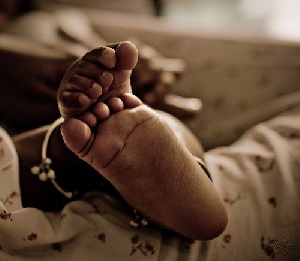Gains made in reducing under-five mortality and morbidity in Ghana risk setback as an important child health promotion. tool - Child health records, popularly called ‘Weighing Cards’ - is in short supply nationwide.
‘Weighing Cards’ serve as a guide to caregivers on breastfeeding, immunisation, home- care management, nutrition and family planning, and, therefore, remains an effective tool to promote child health.
However, women who have delivered at various health facilities across the country over the past one year say instead of ‘Weighing Cards’, the name of their newborn babies is written on a piece of paper, which is given to them to use when attending child welfare clinics.
Nursing mothers take their infants to child welfare clinics, popularly called ‘weighing’, for up to five years in order to help reduce under-five mortality and morbidity.
A good use of the ‘Weighing Card’ by mothers promotes child health.
When contacted, officials of the Ministry of Health blamed the non-availability of weighing cards on the fire that razed down the Central Medical Stores in Tema in January 2015, over one-and-half years ago.
An audit established that the total cost of the Central Medical Stores fire disaster is ?356.1 million (?356,154,008.28), far higher than ?237 million reported in the first few days after the fire.
The Central Medical Stores is a medical warehouse for the Ghana Health Service, where all medicines and medical equipment are kept for distribution to health facilities in the country.
The place also houses the Central Mechanic Workshop.
Heavy fire ripped through the Central Medical Stores and left behind ashes of burnt medications and equipment.
It destroyed all medicines, including the equipment in stock to prevent Ebola from entering Ghana.
The paper-based child health record, as used by the Ghana Health Service, is given to parents on or just after the birth of their child.
It is used by parents to record standard health details such as height and weight, as well as developmental milestones such as first words and first time walking.
As the record matures, additional information is added in the form of inserts to aid parents with certain medical conditions, such as Down syndrome.
It is very important to maintain the record of a child’s health, starting from childhood days.
Many factors contribute to the disease condition in the middle age/old age. Also, the family history matters a lot so that a paediatrician can consider these and advise to prevent or delay the onset of familial disease.
For all these, maintaining a child’s health is crucial.
It is important to read and understand each child's complete health record since existing health problems are interrelated with screening and exam results.
All results and follow-up should then be clearly explained to parents.
The cornerstone of a good child healthcare is a partnership of children and families with a system of healthcare that ensures families have a continuous, ongoing source of accessible medical care.
Health News of Wednesday, 3 August 2016
Source: thefinderonline.com
Gains made in reducing child mortality under threat as weighing cards run out
Entertainment
















